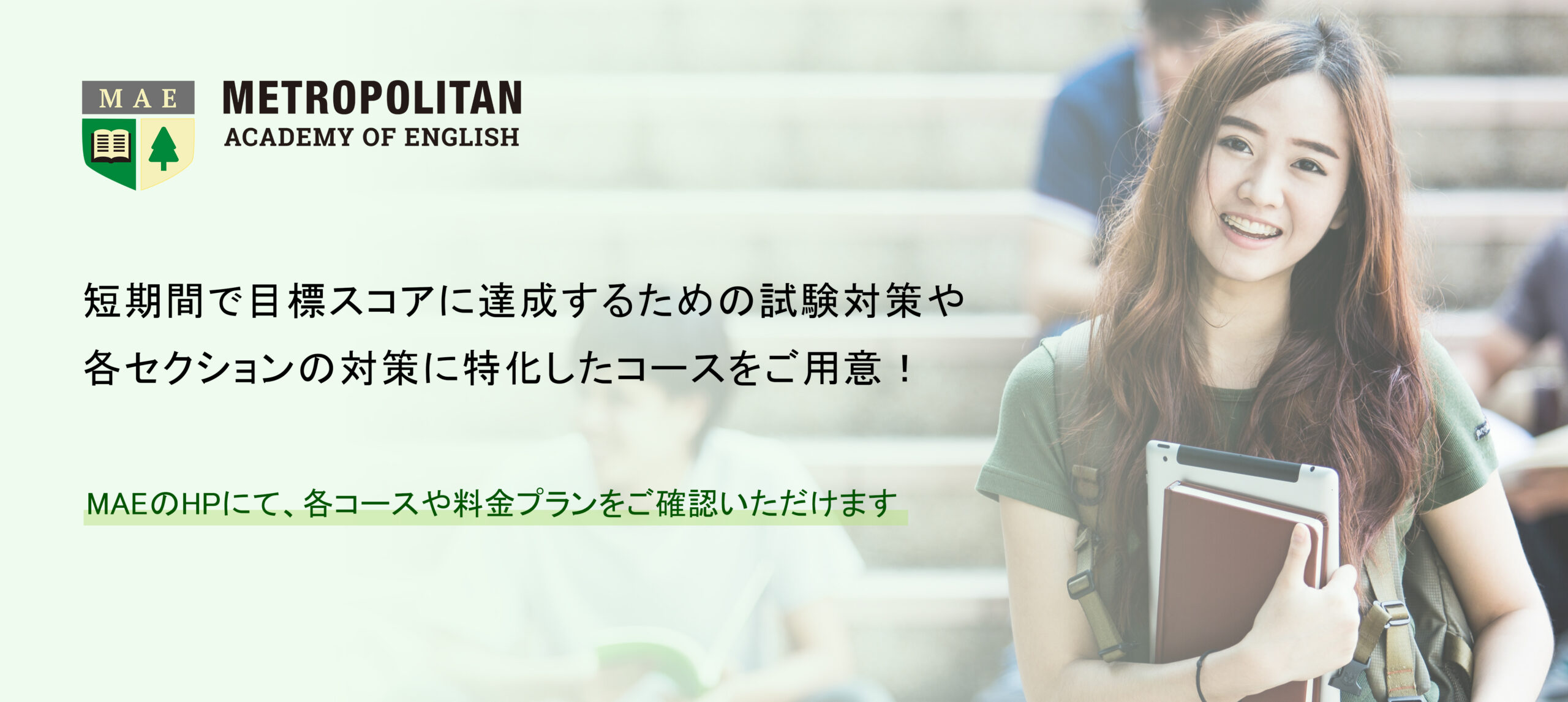IELTSのスピーキングは3つのパートに分かれており、ここではIELTSスピーキングパート3に焦点を当ててお話します。
パート3は試験官とのディスカッション。ライティングの課題のように一般知識を問われる問題が多く取り上げられます。
答えが即時に思いつかない人もたくさんいるでしょう。IELTSではとにかく予想外な質問が出題されるので、解答に詰まってしまった経験はありませんか。
インタービューは対面式で行われるので、誰でも緊張するものです。話すネタが思いつかず取り乱してしまい、自分でも何を言っているのかわからなくなったり、そもそも頭が真っ白になり話すネタが思い浮かばなくなったりすることはよく起こります。
したがって、事前に問題について考えを持っておくことはとても大事です。当校では、短期の方であれば直前対策予想問題を一緒にやっていき、課題に対する知識を植え付けます。そして長期の方へは当校のオリジナル問題(音声、サンプル付き)を提供し、スピーキングのコツや答え方を指導いたします。
パート3の質問形式はいくつかありますが、共通して言えることは具体例を入れたり、対比させたり、自分の考察や解決策を入れてフルアンサーにもっていくことが重要です。また、比較を用いたり、”IF”を使ったりして幅広い表現ができるようにしましょう。
未来のことを予想したり、解決策を提案したりして話を発展させることも高得点につながります。
出題タイプ別の対策
スピーキングのパート3では、自分の意見を問われる問題だけでなく、「どちらが良いか?」と2択を求められる選択問題も出題されます。
例】Who prefers travelling abroad? The young or the old?
このような問題では、対比させることが肝心。 ➡ ①まずは答えを言いましょう。 I think young people prefer travelling more than older people. *日本語訳 若い人たちは、年配の人たちよりも旅行が好きだと思います。 ➡ ②その理由を論理的に説明しましょう。 Because, young people have more physical strength and curiosity that drive them to go abroad. *日本語訳 というのも、若い人は体力もあり好奇心もあるので、海外に行きたいという気持ちになるんです。 ➡ ③老人と対比させましょう On the other hand, the older people have more or less mobility issue that can prevent moving around a lot of different places. Of course, some older people are active and love to go travelling, but the young are more inquisitive about the world and unknowns and want to experience new things. *日本語訳 一方、高齢者は多かれ少なかれ運動能力に問題を抱えており、さまざまな場所を移動することができません。もちろん、年配の方の中にはアクティブで旅行が好きな方もいますが、若い方は世界や未知のものへの探究心が強く、新しいことを経験したいと思いがちです。 |
スピーキングのパート3では、5W1Hの問題が出されます。
5つのWとは、「When:いつ」「Where:どこで」「Who:だれが」「What:何を」「Why:なぜ」そして、
1つのHとは、「How:どのように」です。
例】What kinds of jobs need imagination?
このような問題では、具体性が非常に大事ですので、具体的な場面を例に挙げると話しやすいです。 ➡ ①まずは答えを言いましょう。 I think artists and musicians need a lot of imagination. *日本語訳 アーティストやミュージシャンには想像力が必要だと思います。 ➡ ②その理由を論理的に説明しましょう。 Because, they need to create something from scratch and originality is their strength, not copying others. *日本語訳 なぜなら、彼らはゼロから何かを生み出す必要があり、他人のコピーではなくオリジナリティが強みだからです ➡ ③具体例をあげましょう。 for example, my friend is an artist. She has a different way of thinking about the world and I sometimes do not understand why she thinks about it in such a particular way. But I understand her now that she can create something new because she is different from the majority. The other day, I saw the pictures she took, the photos show the subjects from different angles. I feel she has different senses of visuals. *日本語訳 例えば、私の友人はアーティストです。彼女は世界について異なる考え方を持っていて、私は時々、彼女がなぜそのような特殊な考え方をするのか理解できません。しかし、彼女が大多数の人とは違うからこそ、新しいものを生み出すことができるのだと、今は理解しています。 先日、彼女が撮影した写真を見たのですが、被写体をさまざまな角度から撮影していました。彼女には視覚的な感覚の違いがあるのだと思います。 |
スピーキングのパート3では、何か同意するか否か意見も聞かれます。
例】Sometimes people should tell lies. Do you agree?
このような問題では、問題文をリピートするような形で答えを言いしっかりとした根拠が必要です。そして、ここでも自分の解答をサポートする具体例を入れるともっといいです。 ➡ ① まずは答えを言いましょう。 I agree that people sometimes need to tell lies. *日本語訳 人は時に嘘をつかなければならない、ということに賛成します。 ➡ ②その理由を論理的に説明しましょう。 I know white lie. it is a good lie. I should not hurt someone particularly friends or my family by telling the truth. Truth is often hard… if they are small or unimportant matters, we do not have to tell the reality. *日本語訳 私はたわいもない嘘は理解しています。それは良い嘘です。本当のことを言うことで、誰か特に友人や家族を傷つけてはいけないでしょう。真実は時にして難しいものです…もしそれが小さな、あるいは重要でない事柄であれば、私たちは現実を語る必要はありません。 ➡ ③具体例をあげましょう。 for example, I have many occasions that I did not tell my friends about their makeup. I always think natural is better, but some friends put so much makeup on their face and not good for their skin. but I always think if they want to do it, so be it. *日本語訳 例えば、私は友人の化粧について何も言わなかったことがあります。私はいつもナチュラルな方がいいと思っているのですが、友人の中には化粧をしすぎて肌に良くない人もいます。 でも、彼らがやりたいと思うなら、そうすればいいといつも思っています。 ➡④具体例の他にそれは自分の考察を入れましょう I think telling lies happens all the time in our lives. it is necessary part of being in a group or society, because you cannot tell truth all the time if you are care for others. *日本語訳 嘘をつくことは、私たちの生活の中で常に起こっていることだと思います。それは、集団や社会の中で必要なことであり、他人を思いやる気持ちがあれば、常に真実を語ることはできないからです。 |
【頻出例題】IELTS スピーキング パート3 Cultureトピック
パート3では「FULL ANSWER」が求められます。
IELTS スピーキングパート3の対策についての詳しい情報はこちら
【問題】
質問文の音声が流れます。
10秒間、間をおいて次の質問が流れます。
(10秒間で答えなければならないと言うことではないので、音声を止めても構いません)

Culture [part 3] 6問.mp3
MP3 オーディオファイル 188.6 KB
【スクリプトと解答例】
▶Library / Book
Q. What are the advantages of reading books?
A.When it comes to reading books, I could think of various benefits. One of the direct benefits of reading books is that people develop their literacy skills. Children and second-language learners often use books suitable for their levels to acquire a new language, because through reading books their lexical knowledge as well as grammatical knowledge develops. Some scholars argue that reading enhances children’s relational skills because they reflect themselves to the protagonists and re-experience what the character undergoes in the story.
Q. What books are popular in Japan?
A. Children and adults alike read comic books in Japan. The genre of those comic books could be adventures, mysteries, love stories, and friendships. Foreign visitors are quite surprised to see adults, even ones in their 50s, read comic books on the train. These comic books are even translated and exported to many Asian countries.
Q. What is the difference between men and women when choosing what to read?
A.I cannot quite express it well, but generally speaking, I believe men tend to choose “manly books”, such as adventures, biographies, mysteries, and science fictions. On the other hand, women prefer to read romance, fantasies, and human dramas, something considered feminine. I think the covers of book play a crucial role in this, and not necessarily the content of the book.
Q. What kind of books do children like? Why do they like reading it?
A. Children like simple stories; there is a protagonist, either a hero, a heroine, or perhaps both, and there is an evil entity, and the protagonists fight against the evil and win in the end. My theory is that children like to read those simple books because they are utterly powerless in their own lives. There are always parents, teachers, or some other adults who have authority over them. In those simple stories, children reflect themselves on the powerful and free protagonists.
▶Music
Q. What are the benefits of learning to play musical instruments?
A. One benefit that came into my mind is that musicians learn how to coordinate and collaborate with one another by playing music with others. When playing a musical instrument, often times musicians play with other people, whether it be in orchestras, bands, quartets, or duets. When playing each note, they create harmonies with other instruments. In such circumstances, many people learn how to coordinate and harmonize with other people, which is applicable in non-musical contexts of their lives.
Q. What are the benefits of listening to music?
A.I think a lot of benefits exist when it comes to listening to music, but one in particular sticks out to me. I don’t really know the science behind it, but from what I’ve experienced, I know music can help me “de-stress”. Before taking an exam, I listen to my favourite song. I can feel my heart rate slow down, and I find myself breathing deeply, which help me do well on the exam. This must not just happen to me, because when I watch athletes on TV, I sometimes see them listening to music before their competition or race begins. These athletes include swimmers, skaters, boxers and any type of athlete, really. When listening to music, they seem to be in a trance, concentrating really hard. Then, when they’re ready, they turn off their music and put their “game face” on. If music didn’t help them concentrate and pull out their “game face”, I don’t know what did.
パート3の例題
パート3の練習問題を集めてみました。アイディアが浮かばない人には必ず役に立ちますので、ぜひ試してみてください。
| 1. Why do people like to use social media? What kinds of things are popular on social media? What are the advantages and disadvantages of using social media? What do you think of making friends on social network? |
| 2. When do people feel bored? What can people do when they feel bored? Do people get bored about daily routines? Is it easier for the young people to feel bored than for the old? |
| 3. What traditional handcrafts are popular in Japan? What do young people think of traditional handcrafts? Do people in your country send handcrafts as gifts? What are the benefits of making handcrafts? |
| 4. What can governments do to improve people’s health? What activities can school organize for children to keep fit? How can you tell whether a website is reliable or not? Do you think people are healthier now than in the past? |
| 5. Why do parents let their children play puzzles? What kinds of puzzles improve people’s intelligence? Why are detective stories attractive to people? Which do you think is better? A detective movie or its original novel? |
| 6. Do people communicate more when they talk face to face? What do young people have conversations about? Do people have conversations more or less than they did in the past? Do you think we need to be good at communication at work? |
| 7. Do you think arguments are important? What do family members usually have arguments about? Is it easier for you to have arguments with your family or with your friends? Do you think people should change the way they think when having arguments? |
| 8. How do young and old people use mobile phones differently? What positive and negative impact do mobile phones have on friendship? Is it a waste of time to take pictures with mobile phones? Do you think it is necessary to have laws on the use of mobile phones? |
IELTSパート別スピーキング対策なら



